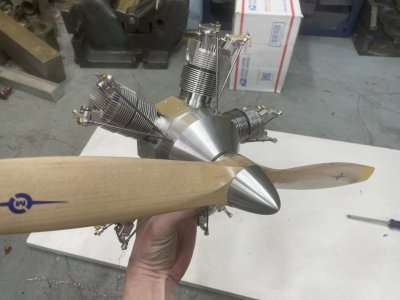- Joined
- Mar 9, 2018
- Messages
- 465
I'm currently working on building a 5-cylinder radial glow-plug engine (which I'm documenting in another thread).
This is just about my first foray into the world of RC fuel; internet search results range from pre-bottled fuel to full chemistry setups.
The set of drawings I'm working from calls for "Methanol with 3 to 5% Nitromethane".
There's separate oil system, so no need to add any oil to the mix.
General advice is more than welcome and appreciated, but I'm especially looking to figure out the following:
1. Is it as simple as buying some methanol and nitromethane, then mixing them in the appropriate ratios?
2. Mix by weight or volume?
3. Where does a regular fella pick up methanol or nitromethane, local to Minneapolis would be preferred. Online prices seem to be insane.
4. Has "RC fuel technology" advanced to a point where there's a better suited fuel than the recommended Meth+Nitro combination?
Hey @Dhal22, don't think I forgot that you offered to buy the fuel for the first test run!!

This is just about my first foray into the world of RC fuel; internet search results range from pre-bottled fuel to full chemistry setups.
The set of drawings I'm working from calls for "Methanol with 3 to 5% Nitromethane".
There's separate oil system, so no need to add any oil to the mix.
General advice is more than welcome and appreciated, but I'm especially looking to figure out the following:
1. Is it as simple as buying some methanol and nitromethane, then mixing them in the appropriate ratios?
2. Mix by weight or volume?
3. Where does a regular fella pick up methanol or nitromethane, local to Minneapolis would be preferred. Online prices seem to be insane.
4. Has "RC fuel technology" advanced to a point where there's a better suited fuel than the recommended Meth+Nitro combination?
Hey @Dhal22, don't think I forgot that you offered to buy the fuel for the first test run!!
That is incredible, pull this project off and I'll buy the fuel for the test run.



